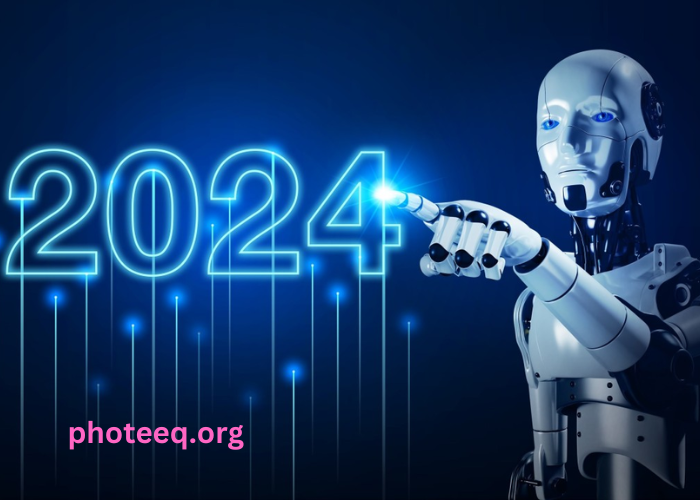
Artificial Intelligence (AI) has steadily transformed industries, businesses, and daily life over the past decade. As we step into 2024, AI is no longer a futuristic concept but a reality shaping the world at an unprecedented pace. From automating tasks to enhancing decision-making, AI technologies are redefining how we live, work, and interact. This article explores the revolutionary role of AI in 2024, shedding light on its applications, innovations, and impacts on various sectors.
AI’s Role in Healthcare Transformation
AI is revolutionizing healthcare by improving diagnostics, personalized treatments, and operational efficiency. Advanced AI models can detect diseases such as cancer at early stages with higher accuracy than human specialists. AI-powered tools also assist doctors in creating tailored treatment plans based on a patient’s medical history and genetics, enhancing recovery rates.
Automation in the Workplace
Workplaces are undergoing rapid automation, with AI streamlining repetitive and mundane tasks. In 2024, industries such as manufacturing, logistics, and administration rely on AI-powered robots and software. While this enhances efficiency and productivity, it also prompts the need for workforce upskilling to align with the evolving job landscape.
AI in the Education Sector
Education in 2024 has significantly evolved with AI integration. Intelligent tutoring systems and personalized learning platforms are providing students with customized educational experiences. AI tools analyze student performance to identify gaps and offer tailored resources, creating more effective and engaging learning environments.
Advancements in AI-Powered Robotics
Robotics powered by AI are becoming smarter and more autonomous. In sectors such as healthcare, construction, and hospitality, robots are performing complex tasks that were once deemed impossible. With AI advancements, robots are now capable of learning from their environment, reducing human intervention.
AI in the Financial Industry
The financial sector has embraced AI for fraud detection, investment analysis, and customer support. AI systems analyze vast amounts of financial data to identify patterns and detect fraudulent activities. Moreover, AI algorithms assist investors by predicting market trends and optimizing portfolio strategies.
The Rise of AI-Powered Smart Cities
In 2024, smart cities leverage AI to enhance infrastructure, traffic management, and energy consumption. AI-powered solutions improve urban living through optimized transportation, reduced emissions, and efficient resource allocation. These cities prioritize sustainability and use data-driven insights for better decision-making.
AI and Climate Change Solutions
Artificial Intelligence is playing a key role in combating climate change. AI systems analyze environmental data to predict and mitigate climate risks. Tools powered by AI enhance renewable energy sources, improve energy efficiency, and monitor emissions, providing sustainable solutions to environmental challenges.
AI in E-Commerce and Retail
AI is transforming the e-commerce and retail sectors through personalization, automation, and predictive analytics. AI algorithms analyze customer behavior to offer tailored recommendations, increasing sales and customer satisfaction. In addition, AI streamlines inventory management and enhances supply chain operations.
The Ethical Challenges of AI
While AI offers numerous benefits, it also presents ethical dilemmas. Issues surrounding data privacy, algorithm bias, and job displacement have become more pressing in 2024. Striking a balance between technological advancements and ethical considerations remains crucial to ensure fair and responsible AI development.
AI in Cybersecurity
The growing sophistication of cyber threats has made AI a critical component in cybersecurity. AI-powered systems detect anomalies, predict breaches, and respond to cyberattacks in real-time. This proactive approach strengthens defenses, protecting organizations and individuals from evolving cyber risks.
AI’s Impact on Entertainment and Media
In the entertainment and media industries, AI is creating immersive experiences through content personalization and production automation. AI algorithms suggest personalized content, while AI tools assist creators in developing visual effects, music, and scripts, streamlining creative processes.
AI-Enabled Autonomous Vehicles
Self-driving vehicles are becoming a reality in 2024, thanks to advancements in AI. Autonomous vehicles use AI algorithms, sensors, and real-time data to navigate roads safely. These vehicles reduce accidents, optimize traffic flow, and offer sustainable transportation solutions, transforming urban mobility.
AI-Powered Virtual Assistants
AI virtual assistants are becoming more advanced, enhancing productivity and communication in both personal and professional settings. Virtual assistants like Siri, Alexa, and Google Assistant now possess enhanced capabilities, such as understanding context, managing schedules, and providing more accurate responses.
AI in Agriculture and Food Production
AI is revolutionizing agriculture by improving crop yields, reducing waste, and optimizing resource utilization. Smart sensors and AI tools monitor soil health, weather conditions, and crop growth, enabling farmers to make data-driven decisions. AI is also enhancing food supply chain operations for better efficiency.
Conclusion
The AI revolution in 2024 is shaping every facet of human life, offering innovations that drive efficiency, sustainability, and convenience. While AI continues to transform industries and improve lives, addressing ethical challenges and ensuring equitable access remain priorities. As we move forward, embracing AI responsibly will unlock its full potential, paving the way for a smarter and more connected future.






